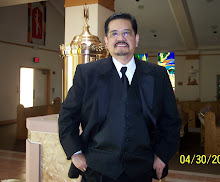Sounds Greek to me.
In fact the word "Pentateuch," comes from two Greek words Penta “five” and teuchos meaning “box,” “jar,” or “scroll.” Originally the word was used as an adjective meaning “a five-scrolled (book).”
The Pentateuch, also known as the Five Books of Moses, is the first part of the Hebrew Bible, comprising Genesis, Exodus, Leviticus, Numbers and Deuteronomy.
In Judaism, it is called the " Torarh,", and is the first part of the Tanakh, while in Christianity, it is the first part of the Old Testament.
Pentateuch is one of the beginning lessons in a fifteen-weekend long Bible course that we are taking along with other church workers from our Parish, the San Andres Apostol, and from the host parish, the Holy Family.
Indeed, our hot summer will be celebrated in a classroom, recalling the hot desert of Mt. Sinai, Moab and other parts in the Middle Eastern world where Jesus Christ walked, lived, preached, suffered and died.
Last Saturday, a speaker traced the path from Egypt, when Moses led the Israelites out of captivity, and journeyed through the barren deserts, pointing to the Old Map and reciting the old names of the modern cities.
Today, outside of the Church, Pentateuch does not ring a bell to the majority of the people.
 |
| Moses with the Ten Commandment Tablets, from the film The Ten Commandments starring Charleston Heston. |
The Ten Commandments which is part of the Book of Exodus, is the mostly recognized element of Pentateuch, mainly because it has been turned into a film classic.
The many sources of the First Five Books, called J Yawhist, E Elohist, Deuteronomist D or P Priestly, have all presented the beautiful stories of Creation (Genesis) and those of the outstanding characters of the Old Testament, starting with the patriarchs Abraham, Isaac, Jacob, Joseph (Genesis 12 - 50), and of the four matriarchs (Sarah, Rebekah, Leah and Rachel), and of Moses who led the Israelites out of Egypt.
Pictured above, a 1768 parchment (612×502 mm) by Jekuthiel Sofer emulated the 1675 Ten Commandments at the Amsterdam Esnoga Synagogue.







No comments:
Post a Comment